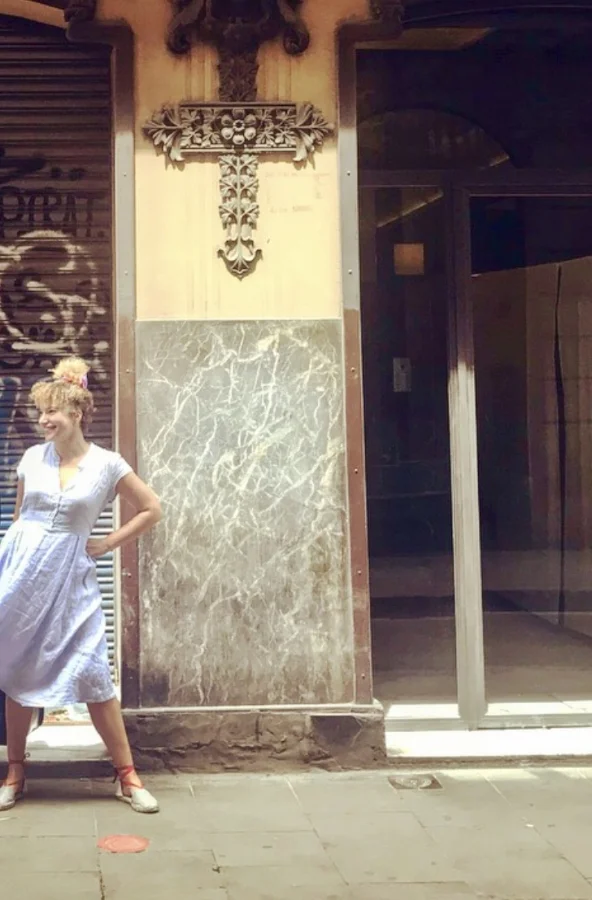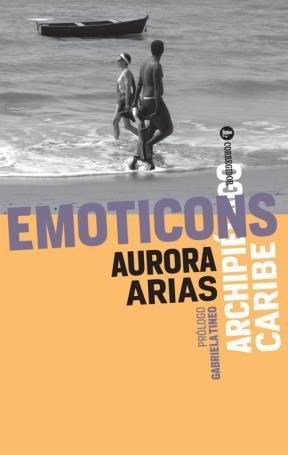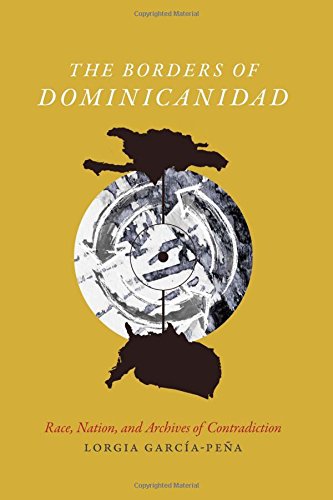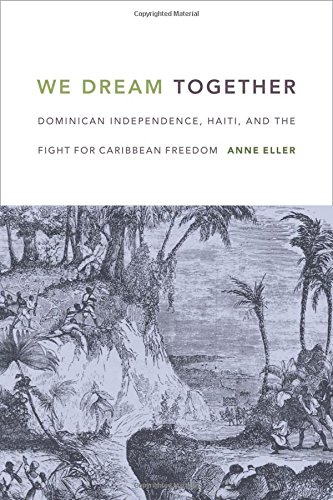Photo courtesy of Dixa Ramírez
By Amaury Rodríguez and Emmanuel Espinal
July 2, 2018
We interviewed author and Brown University Assistant Professor Dixa Ramírez on her new book Colonial Phantoms: Belonging and Refusal in the Dominican Americas, from the 19th Century to the Present ( New York University Press, 2018). Dixa Ramírez's work has appeared in The Black Scholar, Small Axe, Avidly and Acento. In this interview, Dixa Ramírez talks about the legacies of colonialism that still haunt the Dominican Republic and the Caribbean, the hegemony of Western discourses and the alternative modes of cultural productions that continue to inform and shape Dominican society and immigrant communities from the Dominican Republic living in the United States.
What motivated you to write this book?
I wrote the book that I wish existed. My training in broader Caribbean, Latinx, and African Diaspora studies led me to the conclusion that Dominican history and culture had something very unique and even strange to teach us about all of these fields. I yearned for a book that showed how the D.R.’s unique history as a space that hosted a majority free black population for centuries influenced Dominicans’ view of themselves and how others saw them. Because of the global hierarchical order, the ways in which world powers saw (or perhaps more aptly didn’t see) the Dominican Republic would indelibly shape Dominican literature (e.g., Salomé Ureña, Julia Alvarez, Aurora Arias, and Junot Díaz), music and performance (e.g., Amara la Negra, Maluca Mala, Tony Seval, and El Alfa), film (e.g., La Soga, Princesas, and Sand Dollars), and even architecture (e.g., the Columbus Lighthouse).
How do you define dominicanidad?
I don’t think it’s any one thing.
What contributions is your book making to advance the discussion on dominicanidad in the United States?
Colonial Phantoms shows the ways in which Dominican culture and history have a singular place in the Americas as having hosted a majority free black society for centuries. It explores how Dominicans have dealt with this legacy, both on the island and in various diasporic spaces, as well as how non-Dominicans have faced this legacy. I see my book as illuminating how official histories in the D.R. and in the U.S.—both national and regional—have obfuscated this crucial space of black freedom in all its ambivalence.
“Colonial Phantoms shows the ways in which Dominican culture and history have a singular place in the Americas as having hosted a majority free black society for centuries.”
I also argue that some of the main conversations in Latinx, Latin American, and African Diasporic thought have sidelined or misunderstood the Dominican example because these fields themselves contain their own hierarchies of what is the “right” kind of latinidad or blackness to inhabit. Dominicans rarely, if ever, have fit into those right kinds of identity categories. Instead of holding the position as many others have in which Dominicans must learn to be “good” Latinx or black subjects, I asked myself: “what if we paused on what Dominican modes of self-expression—literature, historical narratives, performance, commemorative objects, and so on—are telling us, without either celebration or condemnation? What alternative approaches to viewing our world do we see?”
More broadly, Colonial Phantoms explores the ways in which colonial social structures shaped the supposedly post-colonial spaces we inhabit in all their anti-black, white supremacist, and patriarchal glory.
In recent years, there have been several publications focusing on Dominican society and the immigrant experience of Dominicans abroad. Can you list some of the authors working in and outside of academia that in your view are thinking outside the box and moving beyond a traditional academic paradigm?
When it comes to Dominican studies, I’m not sure that we can talk about a single traditional academic paradigm. In the D.R., conservative nationalism has come to inform a lot of the work that has traditionally been published. Studies about Dominican anti-blackness have been the focus of a lot of work based in the U.S. These two angles are diametrically opposed to each other in many ways. As such, I’m not sure which one you refer to in this question.
I’ve been lucky to be part of a community of people interested telling more complex stories about the Dominican Republic in English (I say this because people have been doing important work for a very long time in the D.R.). Among them, I include folks such as Omaris Zamora, Lorgia García Peña, Anne Eller, Raj Chetty, and Rachel Afi Quinn. I’m only listing those who have recently published or are close to publishing their first book and who work in the U.S. To me, Dominican and Dominican-American writers have also been some of the most likely to express the complexity of Dominican culture and history, especially folks like Aurora Arias, Rita Indiana Hernández, Nelly Rosario, Junot Díaz, Pedro Cabiya (who I know is not Domincan but whose Wicked Weeds is just brilliant), and others. I’d also add that another angle that is insufficiently explored is how literature by Haitian and Haitian-American writers can also illuminate Dominican studies. More specifically, the fact that most Haitian discourses do not at all discuss the Dominican case, whereas Dominican culture (and concomitantly Dominican studies) has been obsessed with Haiti as a reality or as a specter.
What role, if any, do language, bilingualism and translation play in your work?
I don’t know a world in which language, bilingualism, and translation doesn’t play a part. I’ve had to deal with translation since immigrating to the U.S. as an eight year old who didn’t speak English. That I majored in Comparative Literature—a major in which translation and language is central—is not surprising.
Some of the main Spanish-language authors I chose to write about in Colonial Phantoms have not been translated and so I translated most of the works I discuss in my book, including poetry by Salomé Ureña and prose by Aurora Arias. I see translating as an accessibility issue; I want my English-speaking audience to have access to some of these amazing works.
Back in 2003, when I started doing research on Dominican literature as an undergraduate, I was largely on my own. Part of this is my own ignorance about who on campus could have helped me since my focus was on Japanese literature and history. However, a huge part of it was that Dominican literature was not very widely studied in the U.S. because a lot of it hadn’t been translated. Frankly a lot of it wasn’t even easy to find in Spanish on the island. In these early years, I relied on the important work that scholars like Daisy Cocco de Filippis took on to expand U.S. knowledge and access to Dominican literature.
Things are changing though. Just last week I saw that a translation of short stories by José Alcántara Almánzar was published. My syllabi have changed drastically since I started teaching in 2013 with the publication of The Dominican Republic Reader and translation of some of my favorite books such as Rita Indiana Hernández’s Papi. I have also been part of an important Routledge initiative which seeks to translate into English and publish works by Dominican scholars. Another huge event which we cannot ignore is that in that time Junot Díaz exploded in a global literary scene, which led to greater academic interest and investment in Dominican studies.
What topics/ histories remain unexplored within the field of Dominican Studies?
So many! I’m currently working on a book about el monte and “blackness in the hills” as an aesthetic in both the D.R. and the U.S.
Because I’m a literary scholar, I want more work on aesthetics, genre, and theory. Beyond that, more people have also begun working on the Dominican relationship to the Haitian Revolution and the absolutely fascinating and understudied idea that these two countries were, in the nineteenth century, reviled and feared throughout the Americas. I wanted Colonial Phantoms to be a contribution to this endeavor. This island was a black hole (no pun intended) on the map—a presence that people sought to absent lest the whole world gets sucked into its terrifying orbit. I yearn for more work on colonial Santo Domingo beyond Spanish dominion. I also yearn for more work on Dominican popular culture beyond nationalist or even folkloric celebration. I think that scholars, writers, and artists (including social media and visual artists, performance artists, and musicians) have already started to do a lot of this work, which is really exciting.
“I yearn for more work on colonial Santo Domingo beyond Spanish dominion. I also yearn for more work on Dominican popular culture beyond nationalist or even folkloric celebration.”
Part of our history is like a ghost because the academic world closes its door to those who do not have PhD degrees even when those are the ideal people who could shed light on certain Dominican themes. What do you think about it? How could we continue fighting this resistance without succumbing to the barriers imposed by academia?
The academic world is not a monolith. The Dominicanists scholars I know are some of the most receptive to the world beyond academia, especially when it comes to activists, community organizers, writers, and artists. I do agree that within academic spaces, the highest title you can attain—a Ph.D.—will hold meaning, just like an M.D. in a hospital and a J.D. in a courtroom will necessarily hold meaning. I was born in Santo Domingo, raised in the Bronx, and had a fairly typical immigrant experience. None of those realities made me an expert in Dominican literature and history just like being an average white U.S. citizen doesn’t render someone an expert in, say, U.S. imperialism or Hemingway’s prose. I would not walk into an Altos de Chavón School of Design event expecting to have the same level of expertise and knowledge about the plastic arts as a graduate of that place. That doesn’t mean I don’t have important knowledge to contribute to the world. What I mean to say is that having a Ph.D. in the Humanities means something.
That being said, many of the events I’ve attended are open to the public and I receive some of my most enthusiastic interest from non-academic Dominicans and others who like Dominican literature or who have a personal bind to the place. There are people doing exciting work that engages with Dominican culture that do not hold PhDs. This is especially the case on the island where some of the most influential academics don’t hold PhDs at all. In the U.S., I’m thinking of people like the editors and contributors of La Galería magazine or the writers of the huge online forum for Latinx culture Remezcla. Beyond, I think of the long-term work of someone like Miguel D. Mena. Although Mena has a Ph.D., his website Cielo Naranja has hosted academic and non-academic engagements with Dominican culture. I believe that it’s a good thing that we are able to engage these ideas in many different spaces beyond academia. Should we all work hard to make all of these spaces more inclusive? Absolutely.
What is the symbolism behind the cover of the book? Who is the man on the cover image supposed to represent or is it that Dominican history is hairy and entangled in its complexity?
I answer many of these questions about the cover art in my introduction to Colonial Phantoms. The image is taken from a work by Dominican-American artist Firelei Báez. When I first saw it I thought: “This is it.” I felt that with a total conviction, begging my press to choose it instead of another image we had in mind. It was not ultimately my decision, as it rarely is for authors, but I’m so glad they ended up agreeing with me.
____
Related articles
Ten Research Ideas About Dominicans That You Should Pursue (Part I)
Fifteen Research Ideas About Dominicans that You Should Pursue (Part 2)




